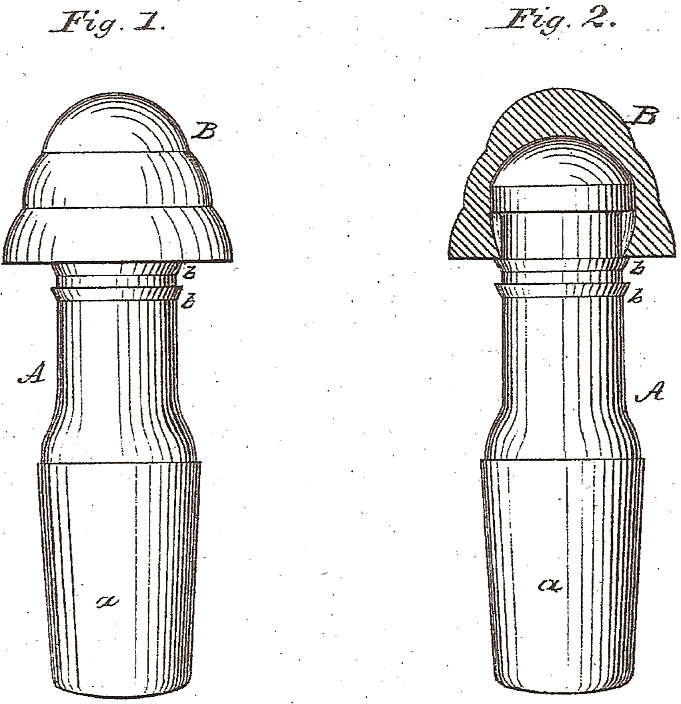John Matthews Bottle Stopper

John
Matthews’ patent application was filed April 10, 1873 and specified:
I, John Matthews, Jr., of…New York…have made a new and
useful Improvement in Self Sealing or Closing Device for Vessels
Containing Liquids Under Pressure…in which…
Figure 1 is a perspective view of the invention, and
Fig. 2 is a section of the same, partly in elevation.
This invention is an improvement on that described in
patent number 67,781, issued to me, date August 13, 1867…
A is a glass stem,
and B a rubber cap, which
correspond to similar parts in the patent above mentioned, but modified
in the following particulars, whereby the device is rendered more useful
and efficient.
The portion a
is made tapering, which gives greater certainty in the working of the
device in sealing where the neck of the bottle or other vessel is of
irregular form. The part
a, when in position, should
nearly fill the space between the neck and itself above the rubber cap
B, so as to prevent dust from
collecting in that portion.
If the portion a is made straight, as shown in the invention of which
this is an improvement, it must either be made too small to fit well the
space so as to exclude dust, or it will become wedged fast, and no
perfect sealing or closing can be effected.
Sometimes the portion a
is slightly bent during the process of manufacture, and if made tapering
it can still be used.
Besides, when of a taper form, the part
a may be molded without any
seam on the side, which cannot be done when it is straight.
Another modification is the making of one, two, or
more rings or projections, as shown at
bb, so that the rubber cap
cannot slide up the stem of A.
The stem A I prefer to
make of glass, but it may be of any other suitable material, such as
porcelain.
Comments:
These improvements were likely the result of hands-on
usage and input from bottlers who adopted the Matthews Gravitating
Stopper and Matthews-type bottles.
The tapered stem’s primary function was to help prevent
contamination of a bottle’s contents by accumulated dust (no doubt a
major problem, given that bottlers delivered by horse-drawn wagons).
Also, there’s no longer mention of attaching a rubber cap to the
upper end of the stem. These
glass stems were typically embossed with Albertson’s and Matthews’
August 26, 1862, October 11, 1864, and April 15, 1873 patent dates.
See John Matthews, Jr. Patent No. 67,781 for
additional comments about Matthews Gravitating Stopper bottles, and
Hutchinson Bottle Directory
cataloguing guidelines. See
Joseph Conner Patent No. 351,496 of October 26, 1886 for subsequent
design improvements.
 HutchBook.com
HutchBook.com